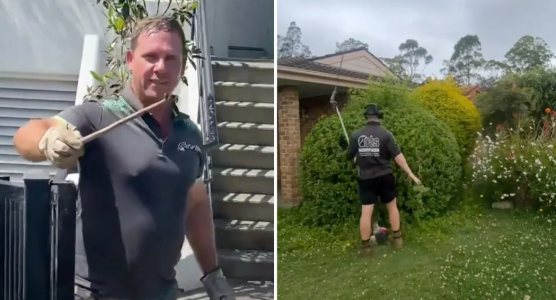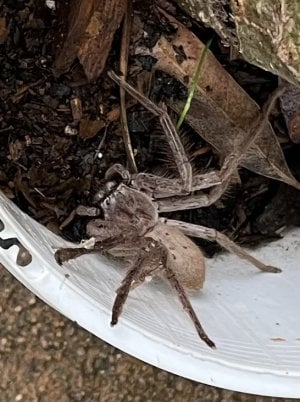Deadly discovery in your backyard—here's what you need to know to stay safe!
By
Gian T
- Replies 20
As the sun climbs and the days grow warmer, Australian gardeners eagerly roll up their sleeves, ready to tend to their beloved plants.
However, a recent chilling encounter reminds us that our backyards can also be home to some of Australia's most dangerous creatures.
Daniel Smith, a seasoned professional with Out of Time Services, was working in a reserve when he came within a hair's breadth of a Sydney funnel-web spider—a species infamous for its highly toxic and fast-acting venom.
Smith's close call is a cautionary tale for all Aussies to remain vigilant while enjoying the great outdoors, especially during these active months for such deadly threats.
'I was just pulling out some dead plant roots when I saw him. Luckily, I had gloves on,' Smith recounted.
The Sydney funnel-web spider is endemic to Australia. It is prevalent in eastern Australia and is notorious for being among the world's deadliest spiders.
They favour moist, cool, and sheltered habitats—under rocks, inside rotting logs, and within dense shrubberies of gardens.
The Australian Museum notes that they are rarely found in open areas like lawns, preferring the seclusion of rockeries.
Smith, who has years of outdoor experience, wasn't overly surprised by his find, especially given the early hour and ample shade—conditions that funnel-web spiders find ideal.
'The funnel web spiders like a damp, dark environment where they can just burrow into the ground and make their little nest,' he explained.
However, these spiders can become quite aggressive when their nests are disturbed, posing a significant risk to gardeners and homeowners alike.
The gardener surmised that the spider he encountered was likely a male on the prowl for a mate.
Male funnel-web spiders are most active from November to April, a period of warmer weather and increased human activity in gardens.
During this time, males wander into suburban areas, sometimes becoming trapped inside homes or garages.
It's important to note that while not all funnel-web species are dangerous, the male Sydney Funnel-web Spider (Atrax robustus) is responsible for all recorded deaths (13) and many medically serious bites in Australia.
Male venom is particularly toxic due to a component known as Robustoxin, which affects the nervous systems of humans and monkeys but not other mammals.
The Australian Museum cautions that while female bites have not caused deaths, they should not be considered safe.
In light of his encounter, Smith offers sage advice to fellow Aussies:
Always wear gloves while gardening and use digging tools like a small spade to minimise the risk of coming into contact with a funnel web.
'Just be on the lookout and wary when you're out in the garden,' he warned.
It's also worth noting that some spiders are commonly mistaken for funnel-web spiders, such as the Sydney Brown Trapdoor Spider, the female Mouse Spider, and the Black House Spider.
Correctly identifying these creatures can prevent unnecessary panic and ensure proper action is taken if a bite occurs.
Credit: TikTok

Have you ever seen a dangerous spider in your garden? What did you do? What safety steps do you take while gardening, especially in warmer months? Feel free to share your thoughts and opinions.
However, a recent chilling encounter reminds us that our backyards can also be home to some of Australia's most dangerous creatures.
Daniel Smith, a seasoned professional with Out of Time Services, was working in a reserve when he came within a hair's breadth of a Sydney funnel-web spider—a species infamous for its highly toxic and fast-acting venom.
Smith's close call is a cautionary tale for all Aussies to remain vigilant while enjoying the great outdoors, especially during these active months for such deadly threats.
'I was just pulling out some dead plant roots when I saw him. Luckily, I had gloves on,' Smith recounted.
The Sydney funnel-web spider is endemic to Australia. It is prevalent in eastern Australia and is notorious for being among the world's deadliest spiders.
They favour moist, cool, and sheltered habitats—under rocks, inside rotting logs, and within dense shrubberies of gardens.
The Australian Museum notes that they are rarely found in open areas like lawns, preferring the seclusion of rockeries.
Smith, who has years of outdoor experience, wasn't overly surprised by his find, especially given the early hour and ample shade—conditions that funnel-web spiders find ideal.
'The funnel web spiders like a damp, dark environment where they can just burrow into the ground and make their little nest,' he explained.
However, these spiders can become quite aggressive when their nests are disturbed, posing a significant risk to gardeners and homeowners alike.
The gardener surmised that the spider he encountered was likely a male on the prowl for a mate.
Male funnel-web spiders are most active from November to April, a period of warmer weather and increased human activity in gardens.
During this time, males wander into suburban areas, sometimes becoming trapped inside homes or garages.
It's important to note that while not all funnel-web species are dangerous, the male Sydney Funnel-web Spider (Atrax robustus) is responsible for all recorded deaths (13) and many medically serious bites in Australia.
Male venom is particularly toxic due to a component known as Robustoxin, which affects the nervous systems of humans and monkeys but not other mammals.
The Australian Museum cautions that while female bites have not caused deaths, they should not be considered safe.
In light of his encounter, Smith offers sage advice to fellow Aussies:
Always wear gloves while gardening and use digging tools like a small spade to minimise the risk of coming into contact with a funnel web.
'Just be on the lookout and wary when you're out in the garden,' he warned.
It's also worth noting that some spiders are commonly mistaken for funnel-web spiders, such as the Sydney Brown Trapdoor Spider, the female Mouse Spider, and the Black House Spider.
Correctly identifying these creatures can prevent unnecessary panic and ensure proper action is taken if a bite occurs.
Credit: TikTok
Key Takeaways
- Australians are warned to be vigilant for dangerous spiders, like the Sydney funnel-web, when outdoors.
- Daniel Smith, a gardener, had a close encounter with a deadly Sydney funnel-web spider while working.
- Male Sydney funnel-web spiders are known for their highly toxic venom and are active during warmer months, often entering gardens.
- Gardeners are advised to wear gloves and use tools when digging to avoid spider bites and to be aware of similar-looking but less dangerous species.
Last edited:









